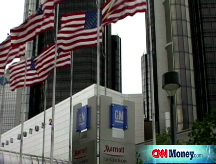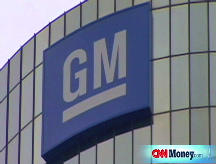Will the auto bailout work?
Now that GM and Chrysler are getting $13.4 billion, only two things are certain: more pain lies ahead for Detroit and the cost of the bailout will rise.
NEW YORK (CNNMoney.com) -- General Motors and Chrysler LLC are finally getting the money they need to avoid an imminent collapse. But will the bailout actually get them back on the road to profits?
The $13.4 billion in federal loans announced by President Bush Friday morning should be enough to get the automakers through the next few months. Then the fate of Detroit will become a problem for President-elect Obama and the newly-elected, much more Democratic Congress to tackle.
But this lifeline won't solve the immediate problems dogging the entire U.S. auto industry. Tight credit and a weakening U.S. economy have left industrywide auto sales at their weakest point in 26 years.
Chrysler's North American production is essentially shutting down for at least a month at the end of the day Friday due to weak demand for its vehicles. The North American assembly lines at GM (GM, Fortune 500) will be closed for the entire month of January.
Ford Motor (F, Fortune 500), which benefits from having more cash on hand than its U.S. rivals, only looks good by comparison. It is keeping 10 of its 15 assembly lines idle one week longer than the normal holiday shutdown.
The automakers argue that Friday's loan was needed to deal with their immediate cash crisis and allow them to complete the restructuring plans that have been underway for several years.
GM and Chrysler will use the money to fund their operations through March, as they try to negotiate additional cost savings from the United Auto Workers union and holders of their unsecured debt, as well as additional savings on their labor contracts. All this is needed so they can prove to the new administration that they are viable in the long-term.
Industry critics say this plan won't force the automakers to do what is really necessary to become competitive with the nonunion auto plants operating in the United States by overseas automakers. They wanted tougher rules that would have forced the companies into bankruptcy unless the union agreed to painful wage and benefit cuts.
"Over and over again we've seen these guys use creative math to give the illusion of competitiveness," said Peter Morici, a business professor at the University of Maryland.
Other critics argue that without a more competitive labor agreement, there's no way the automakers can compete in the long term. To them, the loans only reduce the incentive for the automakers and UAW to agree to changes that are needed.
"No one enjoys a crisis but sometimes it is the best opportunity to bring real reform," said Sen. Bob Corker, R-Tenn., in a statement. Corker played a key role in the debate that eventually led to the bailout failing in the Senate a week ago.
But some experts say the automakers have already been making the tough choices needed to close the competitive gap, and that they're likely to speed up those changes now that they have the emergency loans.
"I think it's almost certain that there will be more of what they've been doing already, [such as] reducing the capacity and their labor costs," said Bob Schulz, chief auto credit analyst at Standard & Poor's. "Things will now move more dramatically than they have been moving."
Supporters of the bailout, including the management of the Big Three U.S. automakers, argue that the unions have already closed much of the wage gap with the nonunion plants. And they say changes made in the 2007 labor deal that will be implemented in 2010 close that gap even further.
"Once these loans are in place, whoever is involved in the oversight will discover they are nowhere near as bad off as people assume them to be," said David Cole, chairman of the Center for Automotive Research, a Michigan think tank that was in favor of government aid to the industry.
"This gives them time to pull things together," Cole added. "It doesn't mean the challenges are over. But it gives them the opportunity to speed the change that has been going on."
The union said Friday it is willing to make additional changes in their contract to save the companies money, as long as others, such as creditors and dealers, also make sacrifices.
Still, it is indisputable that it will take even more money from Washington to truly get the Big Three back on track.
GM and Chrysler should receive $4 billion more from the Treasury Department's bank bailout fund once Congress releases the remaining money set aside for that program.
But even then, the $17.4 billion to GM and Chrysler is only about half of the $34 billion the automakers had requested from Congress at the start of this month.
Once the new Congress and administration are in place, it is likely automakers will be back to ask for the rest of that $34 billion, barring a sudden improvement in auto sales that few are forecasting.
And that $34 billion figure doesn't include $20 billion approved by Congress before the credit crisis to help GM, Chrysler and Ford revamp their plants to produce more fuel efficient vehicles. What's more, the automakers have already requested that this fund be increased to $50 billion.
Finally, each of the Big Three has indicated that their finance arms are likely to seek other bailout money set aside for banks and Wall Street firms so they can help provide needed financing to their customers and their dealers.
Mark Zandi, chief economist for Moody's Economy.com, estimates that the cost of an auto bailout will eventually run as high as $75 billion to $125 billion.
And Zandi said even if GM, Chrysler and Ford get all that money, it is unlikely all three automakers will survive as separate companies. But he still thinks that the loans are a good idea.
"Years down the road, that investment will be deemed a good one, although it may take a decade or two for us to see that," he said. "I think they can be molded into viable companies. I think there will be a domestic auto industry on the other side of this."
But S&P's Schulz said it is too soon to say that the Big Three will be able to make it simply because of the uncertain state of the economy.
"If all these adjustments they're talking about are made, they'd certainly be better off. Whether they'll be profitable is hard to say. A lot will depend on what happens with the economy between now and 2011," he said. ![]()




